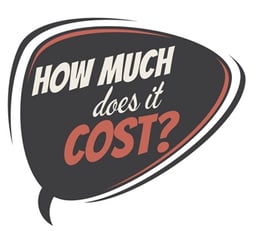Inbound Video Marketing: The Next Online Marketing Revolution
There is a lot of talk these days about inbound marketing; the forms of marketing that involve...


You have the best service or product in the world. The trouble is, nobody knows about it. How do you make more people know about your product today than they did yesterday? That's where marketing comes in.
Marketing is a broad term nowadays and it's easy to get confused by all the strategies and/or technologies you “should” or "can" be used to help your company grow. Many factors contribute to the success and growth of a business, but without marketing and sales (smarketing), a business has little chance of growth, exposure or success.
Companies continue to spend money on marketing because it matters to their bottom line. However, the amount each company spends differs according to a number of factors including growth goals, revenue and industry.
A question that a business owner or marketing manager asks at one time or another is: How much do I invest in marketing / how much do I spend  on marketing? They are very open-ended questions that have a lot of variables to consider. Determining the cost of marketing on a company's bottom line and growth is not black and white.
on marketing? They are very open-ended questions that have a lot of variables to consider. Determining the cost of marketing on a company's bottom line and growth is not black and white.
To consider marketing costs, first answer these questions.
If we look at the data for big brand companies such as Apple, Microsoft, Salesforce, Cisco, and Intel, data suggest they spend between 15% and 50%. That's a wide gap and a high number especially for companies that are very well established in the marketplace and rake in huge revenues.
New companies do not have that kind of money, nor are they established enough for anyone to know who they are. Traditionally it is suggested that companies that are in this situation (one to five years old) should spend about 12 to 20% of gross or projected revenue on marketing.
Established companies, ones that have been in business for more than five years have already gained some market share or brand recognition. Traditionally their marketing spend sits between 6-12%.
While 12-20% might seem like a lot for new companies, remember nobody knows who they are and they need to develop brand recognition and market share. Once their brand is established that number will drop.
 However, this brings up another issue with new companies. Which comes first, the chicken or the egg? If you are a new company you need to grow your brand to make money, but new companies usually have no money to do that. That's why funding is so crucial for start-ups and new brands.
However, this brings up another issue with new companies. Which comes first, the chicken or the egg? If you are a new company you need to grow your brand to make money, but new companies usually have no money to do that. That's why funding is so crucial for start-ups and new brands.
Make sure your dollars are spent wisely.
When it comes to the spend and establishing a strategy there are many different approaches and technologies you can pursue. But how do you know what and how to spend the money when you have so many options like social media, websites, SEO/SEM, advertising (online, PPC, outdoors, print, radio, TV), content marketing, and even trade shows.
Let's break down each one a little further below.
Social Media - There are many social media outlets available...Facebook, Twitter, Google+, Pinterest, Instagram...you get the point. What you spend on one channel, like Twitter, may not be the same as what you spend on Facebook. When it comes to social media marketing Facebook and Twitter are the big two but adding a third or fourth channel could help you increase your audience and engagement as well. industry average spends are wide and range from $500 a month to $10,000 a month.
Website - Your website might be the hub of your business, getting you leads and converting customers. On the other hand, it might just be a simple one-page information site. Websites run the gamut when it comes to price and functionality. Decide what you want and need before embarking on building it. There are simple options like the do-it-yourself website builders offered by companies like WIX. Sites like these can get you up an running quickly but are limited when it comes to SEO or other advanced features. WordPress offers great promise for many because they have a worldwide user base, a lot of pre-designed templates, and great community support, plus they offer many plugins that can help with added functionality and purpose (SEO). If you have the time and skill set to invest in learning these platforms then you are all set, but many business owners have neither. Therefore another option is to have someone build a website for you. Prices will obviously range for a website depending on the functionality you need (shopping cart perhaps), the platform it's built on, the content involved (video maybe) and the agency/developer that is building it.
SEO - Search Engine Optimization is the process of affecting the visibility of a website or a web page in search engine's unpaid results ( referred to as "natural" or "organic", results). This means when someone goes to Google or Bing and types in a keyword like "Philadelphia Tree Care Companies" your business should come up at the top of the list. Having a website that is not properly optimized for search engines is like not having a web presence at all. This means you should carefully consider if building a website on your own is worth it if you don't have the knowledge, time or resources to properly optimize it for search engines. SEO can get deep, very deep; and if you don't know what you are doing, you can actually do more harm than good.
Content Marketing: is creating content around keywords for search engines in which your ideal buyers find your content. Both big and small companies have been embracing content marketing as their main marketing channel because they know the marketplace has changed. Consumers are now in control of how they research and make purchasing decisions and are sick of being bombarded with cold callers and push marketers. Content marketing is about educating your consumers and pulling them into buying from you. Content marketing can involve many forms of content including blogs, videos, white papers, podcasts, animations, live streaming and ebooks. All of these pieces work together to educate/inform the consumer and convert them into a customer.
Advertising: Traditionally a very expensive avenue to take with marketing and one that provides little proof of whether it actually works - until the internet. Budgets that have been used for traditional marketing or advertising like radio spots, TV commercials, outdoor billboards, and direct mail have been shifting to digital (internet) advertising. Why? Because it's cheaper and it provides proof (real mathematical data) as to what is working and what is not. That's the problem traditional forms of advertising have faced, there is no proof that it actually works or you get a return on your investment. Not to mention the price. Have you ever looked into putting a commercial on television? You might blow your budget on producing the spot before you even get to buy the airtime. Digital advertising has changed all of that and most big brands are now shifting their marketing spend to digital because they know they can reach more people with less of an expense. What's more, they can track these people and remarket to them again and again.
Events/Trade shows: Though many trade shows have now gone virtual there is something to wondering around a showroom floor looking at or experiencing the products first hand. If you ever had the pleasure or non-pleasure of staging a booth and presenting at a trade show then only you would know if it works for your company and industry. Trade shows are expensive to do, and if you have done one, then you know you pretty much get charged for everything. Attendance at trade shows has been dwindling because let's face it, it's expensive to fly employees out and put them in hotels for several days. Trade shows or events can range from $5000 up to millions of dollars.
The services/strategies we listed above are by no means the only options you have when it comes to marketing. We didn't even mention reputation marketing, referral marketing, inbound marketing, video marketing...the list can go on but the point is, you have options when it comes to spending money on marketing.
So, how much does marketing cost? There is no one magic bullet when it comes to marketing and utilizing any one of the methods mentioned above can take a sizable chunk out of your budget. You can choose to use only one - but doing one without the other can be a mistake as well. There is only one certain thing when determining your marketing costs: spending nothing will get you nowhere...and that's not where you want to be.
We've given you a lot to think about; If you want more information on the markeiting strategies mentioned above (or not mentioned above), contact us and we can provide you more information.

Get Ahead, Stay Ahead Marketing


There is a lot of talk these days about inbound marketing; the forms of marketing that involve...


The Math Behind Your Marketing
If you're a marketing professional then this blog may touch on a...
Leave a Comment